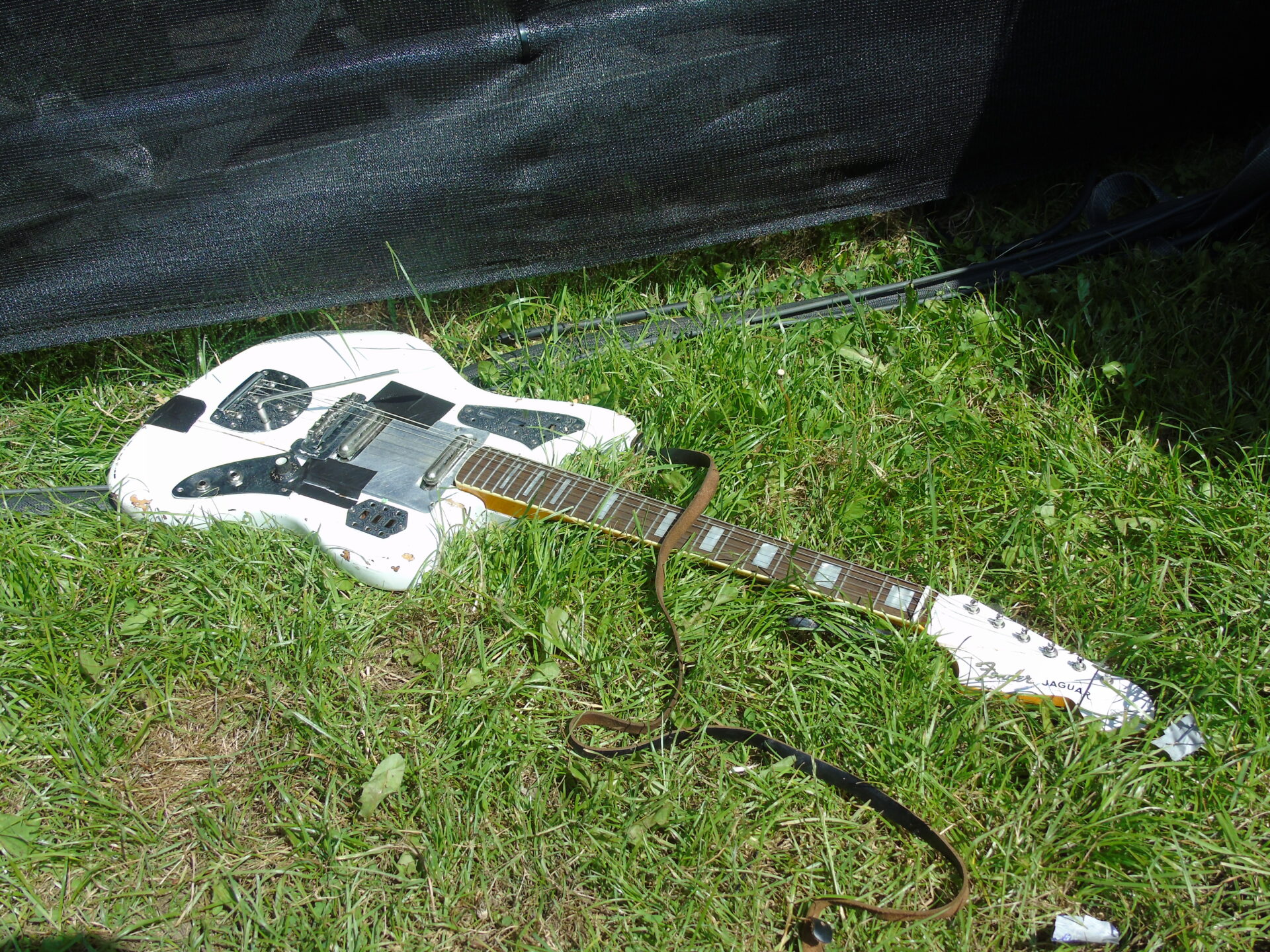When: 27th May 2023
Where: Brockwell Park, London, England.
Wide Awake festival is south London’s biggest annual day event, taking place in the vibrant community of Brixton’s Brockwell Park. It features a varied array of left-field musicians from a range of genres including rock, punk indie, electronic and world music. There are a multitude of stages today including two other open-air stages and a further two tented stages. Alongside this, there are plenty of food, craft, and zine stalls within the event plus a VIP area containing a DJ, boutique cocktail bar and a multitude of deck chairs to sit and sun yourself on, speaking of which the festival organisers are probably fist-punching the air today because it’s brilliant sunshine, 21 degrees peak and not a drop of rain predicted all day.
Arriving around 12-ish when the festival grounds have just opened, the grounds are yet to fill up and it feels like the perfect opportunity to catch the peaceful and thoughtful music of Naima Bock.
Naima Bock
Naima’s brand of quiet but soulful folk begins the day and although she’s the first act on the main stage today there’s still a good amount of audience attendance. She has brought her full band including an additional singer for some of the tracks and after a somewhat lengthy soundcheck, they break out into a perfectly harmonious arrangement of varied instruments, including a saxophone, keyboard, guitars, and drums.
Naima’s vocals carry the group into Nico/Velvet Underground territory and her range is even more apparent live, she fluctuates organically between soprano-style high notes and to what seems like her natural default vocal point which is a lower, more soulful earthy tone. It is a treat to witness and it’s nice to see that there is still an appetite for slower, traditionally-inspired music amongst the crowd.
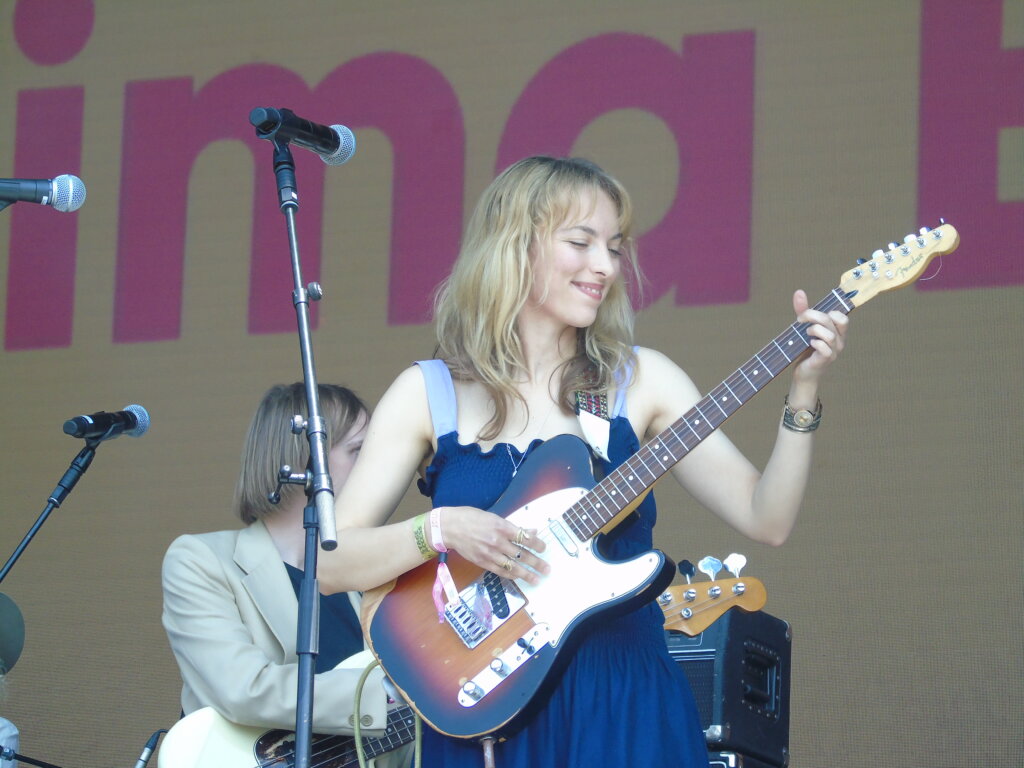
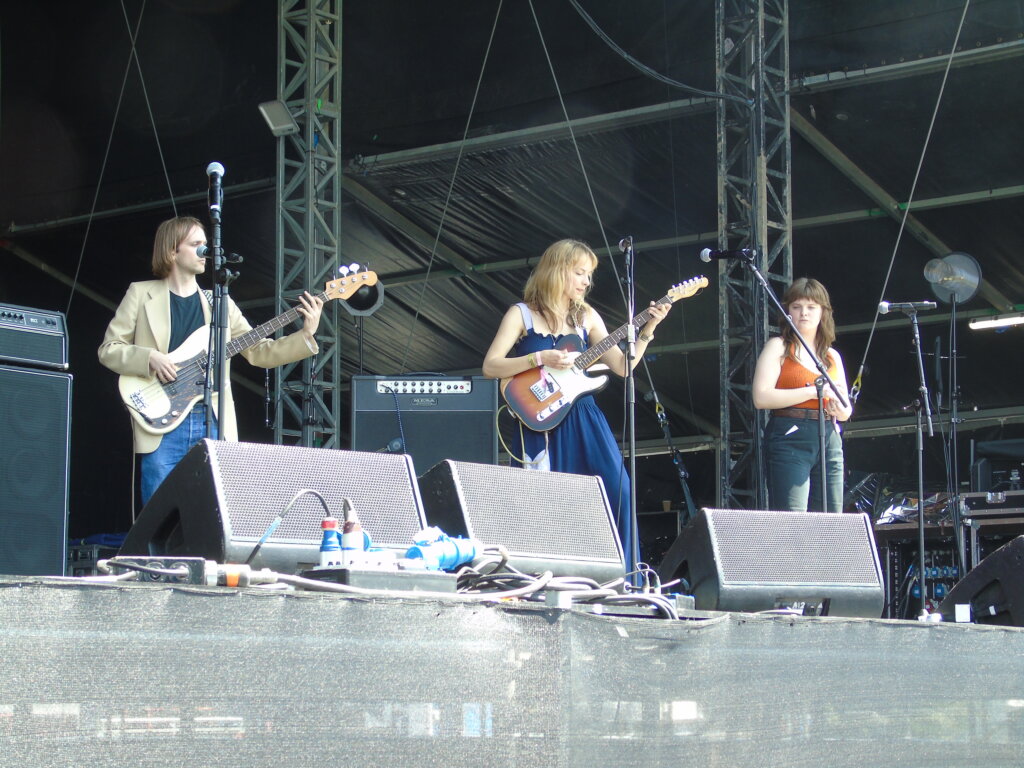
A Place to Bury Strangers
The last bastions of rock and roll are here. Looking like a band of roadies, A Place to Bury Strangers enter the stage in all-black uniforms and promptly break out into a mass of fuzz, distortion, and mumbled lyrics. The beginnings of a mosh pit begin to rumble amongst the centre of the audience and before the first song is out mouths gape as we watch frontman, Oliver Ackermann, deftly throw his guitar into the air before watching it land with a crash on the stage. Commotion arises amongst the crowd as we look on with confusion that the rock and roll trope of instrument destroying at the end of a set has been broken.
Not to worry though, the show goes on as Ackermann grabs another guitar and proceeds to break this one too. Faces change from astonished amusement to vague fear, how is this sustainable? Surely, there aren’t enough guitars on stage to break one during every song. Someone looks pained as they turn to their friend and cry “awwwwh man, I’ve been saving up for a Fender Jaguar for ages”. That’s right, these aren’t even cheap guitars being smashed.
The band thunders on like they’re on Fury Road, the blistering midday sun and surreal, Lynchian visual projections behind them only heightening the feeling of black desert chaos magick. Then they do something no one is expecting: Ackermann jumps off the front of the stage and begins to make his way out into the centre of the field. Bassist John Fedowitz follows suit taking his guitar whilst last to follow is Sandra Fedowitz, carrying a floor tom, half the size of her. The gig moves to classic Lightning Bolt arrangement, in other words, ‘a theatre in a round’. They blast through a couple more songs whilst everyone wonders what the hell is going on and, seriously, god knows how their cables extended that far.
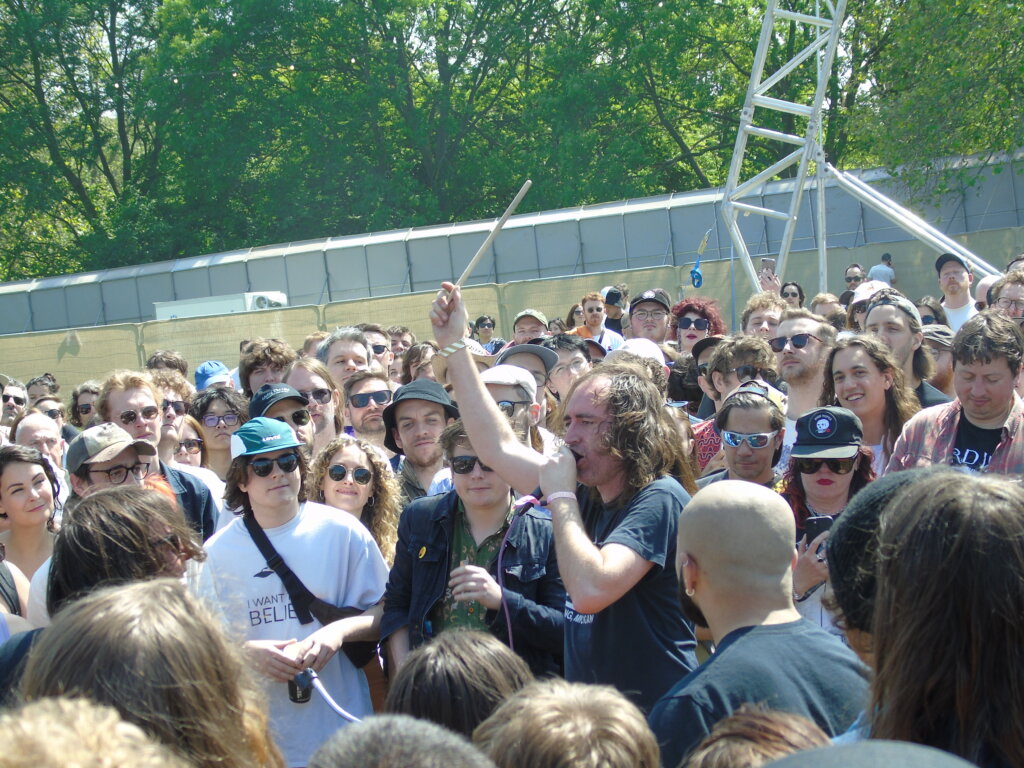
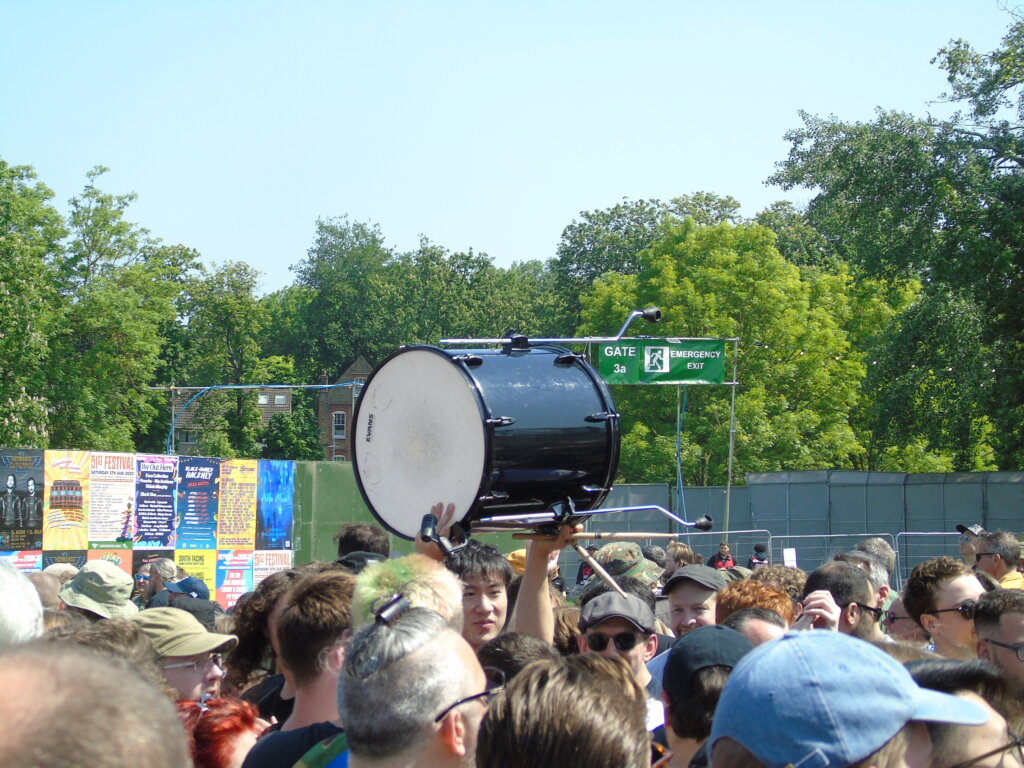
They make their way back to the stage to play out the rest of the set, a security guard mutters how it’s “f**king annoying” as they climb back up. Rock and roll it appears, is rather inconvenient for professional event teams. For a while, it looks like a medium-sized amp is going to face the same fate as the destroyed guitars but it is put down and allowed to continue its job for now. Drummer, Sandra Fedowitz, takes centre stage for a song, again carrying her tom drum out to front and thumping it as she sings riot grrrl style, like a tribal call to arms as she whips the audience into further frenzy.
Ackermann twists and spins behind her wrapping himself up in cables. For the entirety of one song he plays half the body of a guitar that is somehow still bleeding out sound in its amputated state. Another guitar flies through the air and KO’s onto the ground before being exiled off stage onto the grass (see featured image for reference).
All the while, the band’s deafening hum begins to take on the sound of motor engines whirring, their performance embodies a petroleum-soaked desert frequented by thieves and vagabonds (and yes, I realise I’m back to describing Mad Max) who exist in a perpetual state of nightmarish, mescaline-induced hallucinations and for whom the only outlet of creative expression is to embrace the destruction of the void.
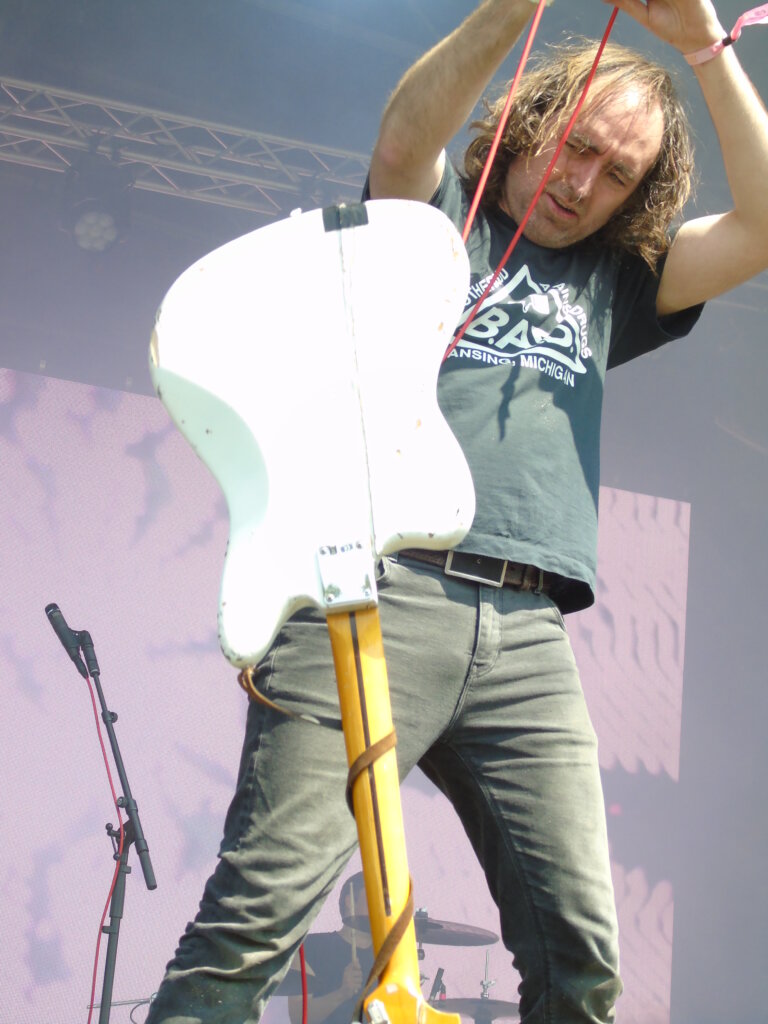
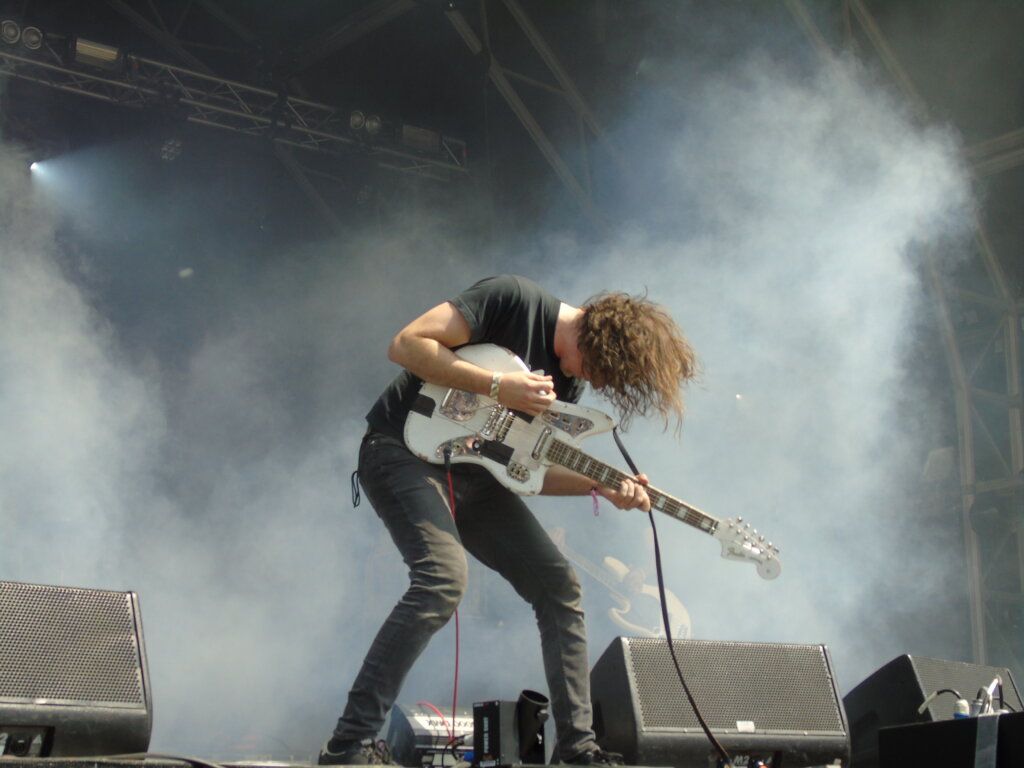
Los Bitchos
And now for something completely different. Los Bitchos are following A Place to Bury Strangers on the same stage and it means at the very least the event security team assigned to this area can take a break now. It’s time to grab a pina colada canned cocktail and get your dancing shoes on for an 80’s cumbia style surf-disco. The group’s predominantly instrumental music with the occasional synchronised vocal and dance moves also appears to reference afrobeat, jazz acts such as the Lijadu Sisters, albeit with a post-punk, indie twist.
Throughout their set, the group stand together in a row (with the exception of drummer, Nic Crawshaw, who sits behind) and intersperse songs with timed jumps and sways. It is completely their own sound and in theory, it shouldn’t work but in practice it sounds great, even A Place to Bury Strangers are watching from the sidelines.
They ask if anyone has been to a Los Bitchos show before, a few people raise their hands before they instruct us all to put our arms in the air, hands turned outwards, and sway from side to side as the slow introduction to ‘Pista (Fresh Start)’ creeps in and everyone begins to move in unison. If you shut your eyes and imagine you’re in Hawaii being draped with a lei before being led into a conga line then you get the idea of the kind of vibe at a Los Bitchos gig.
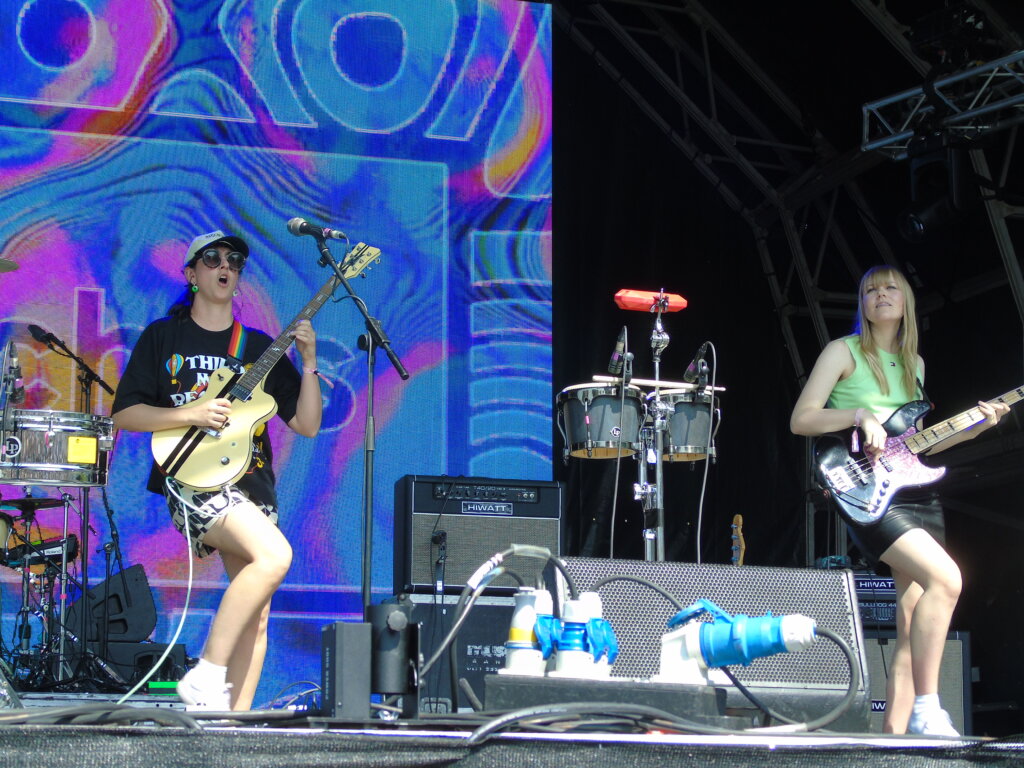

Molchat Doma
Unmoving from the same stage, we now await Belarusian post-punks Molchat Doma who are running roughly half an hour late, much to the disappointment of those hoping to catch the end of Alex G on the main stage as their set is now going to be a full clash situation. The band appear to have recently gained some arbitrary notoriety from one of their songs being used across Tik Tok. Frontman, Egor Shkutko, is reminiscent of Noel Fielding’s character in the IT Crowd, Richmond Avenal: something happened to him that means he never sleeps now.
As the rest of the band follow him out it’s clear that there has been no prepared outfit discussion, they all look like they belong to separate bands. Roman Komogortsev (guitar, synthesizer, drum machine) looks like he could be in a post-hardcore band like Converge or Hope Fails, and Pavel Kozlov (bass guitar, synthesizer) looks like an additional member of The Offspring. Shkutko embodies the style of the music wearing all black, only broken up by white socks (the idea of socks in this weather!)
This smalltime, dark synth-pop, post-punk band who do not speak or sing in English, would, in an alternate universe never make it beyond the boundaries of Eastern European dive bars but thankfully the UK has a healthy appetite for this so-called “doomer music” and the audience laps up the set, with a slightly raised level of berserkness reserved for their “hit” single ‘Судно (Борис Рыжий)’. Shkutko weaves back and forth with his back hunched and a level of intensity in his gaze that never wavers. It’s worth the wait and it’s heartening to see so much love for these underdogs.


Oneohtrix Point Never
It’s rare to see a performance by this DJ so it’s not surprising to see the tent packed out ahead of this set. Chimes echo around the space and for around 7 minutes we’re in what sounds like a gong bath, only it’s not really gongs, it’s chimes but there’s a general feeling of all-encompassing sound, to be cliched about it, it is transcendent and elevating and all of that sort of thing.
After a while, the crush of the crowd becomes too much for me and I make my way out towards the outer skirts of the tent, from here some of the momentum is lost as voices and noises from outside overlap with the sound and it seems apparent that an indoor area where the sound can bounce around would be better suited.
From a squint, it looks like Lopatin has brought along his Roland Juno-60 synthesizer, inherited from his father. Hard to tell whether it’s used or just brought along for the company now. At the end of the set, he sincerely thanks the audience for sticking around, probably recognising that any other ambient-inspired artist might have struggled to retain such a crowd indoors on a hot summer day.
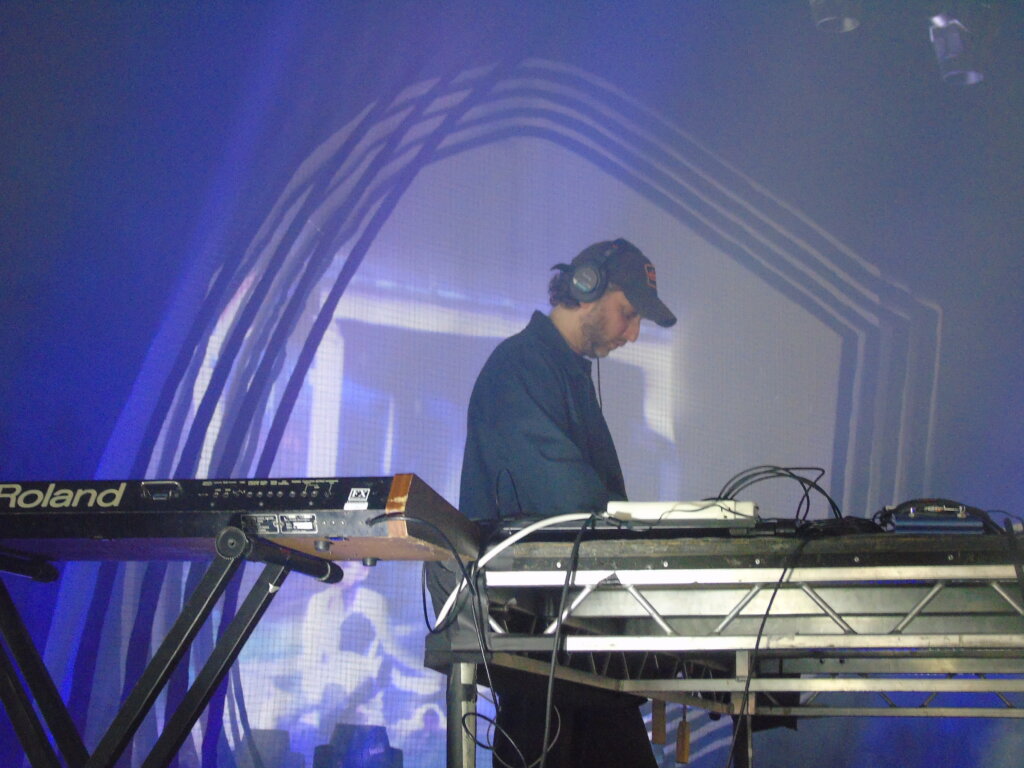
Lebanon Hanover
Continuing with the “doomer” trend, although Lebanon Hanover have been making music long before such terms came about, the duo are long overdue success. And whilst it may be such a canon that they are now adopted under, they will always be embraced by those with more gothic sensibilities. Yet gothic nowadays so often translates to the nervous breakdown of disco, the loneliness of the alcoholic prone to karaoke and poetry within a world that negotiates the best way to optimise the human spirit through consumer values (if you’ve ever played the game Disco Elysium then you get the idea).
Watching Lebanon Hanover is like watching someone come to terms with the reality that they are not as they once believed “an individual” but instead a “subject” for those who perceive themselves to have ideas and knowledge beyond the reach and understanding of “the masses”. We are watching someone dance their way into this mess because naturally, there’s no way out and no one’s optimistic enough to believe that.
‘Gallowdance‘ is the duo’s most known song and the audience gives out a cheer once they break into this. The curl of a smile crosses bassist and synthesist, William Mabelline’s lips, before he continues with his erratic, Ian Curtis-style dance moves. Guitarist, and sometimes vocalist, Larissa Iceglass, has to be one of the coolest women in music right now (pun not intended) and everything she is in control of sounds record-perfect.
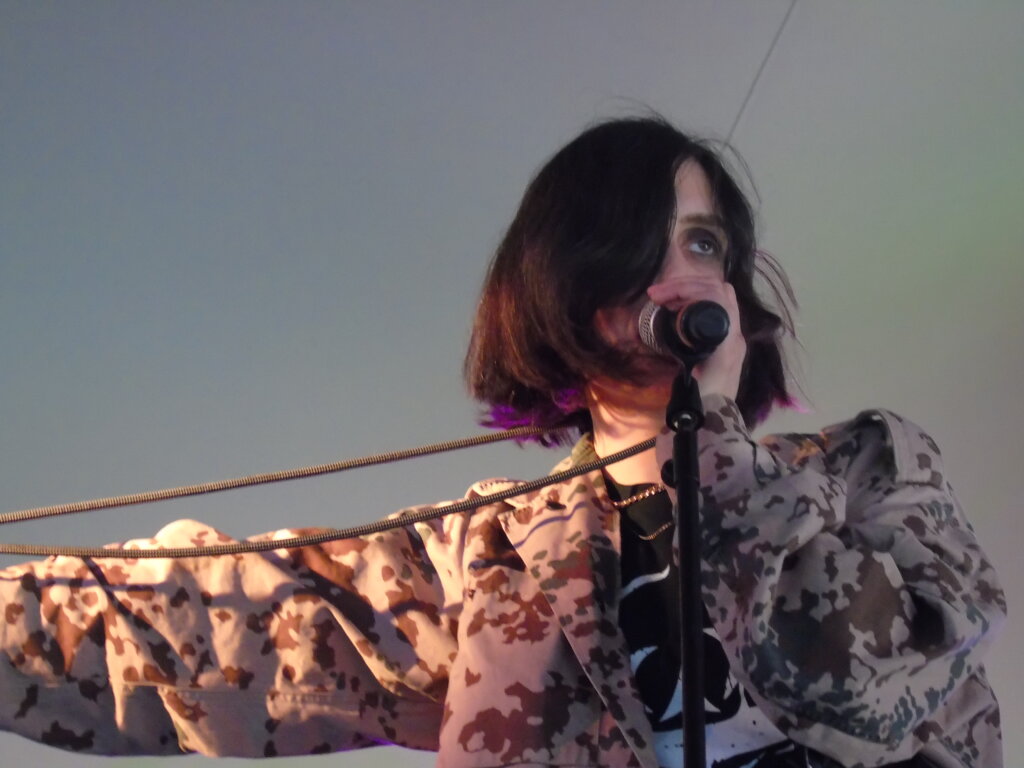
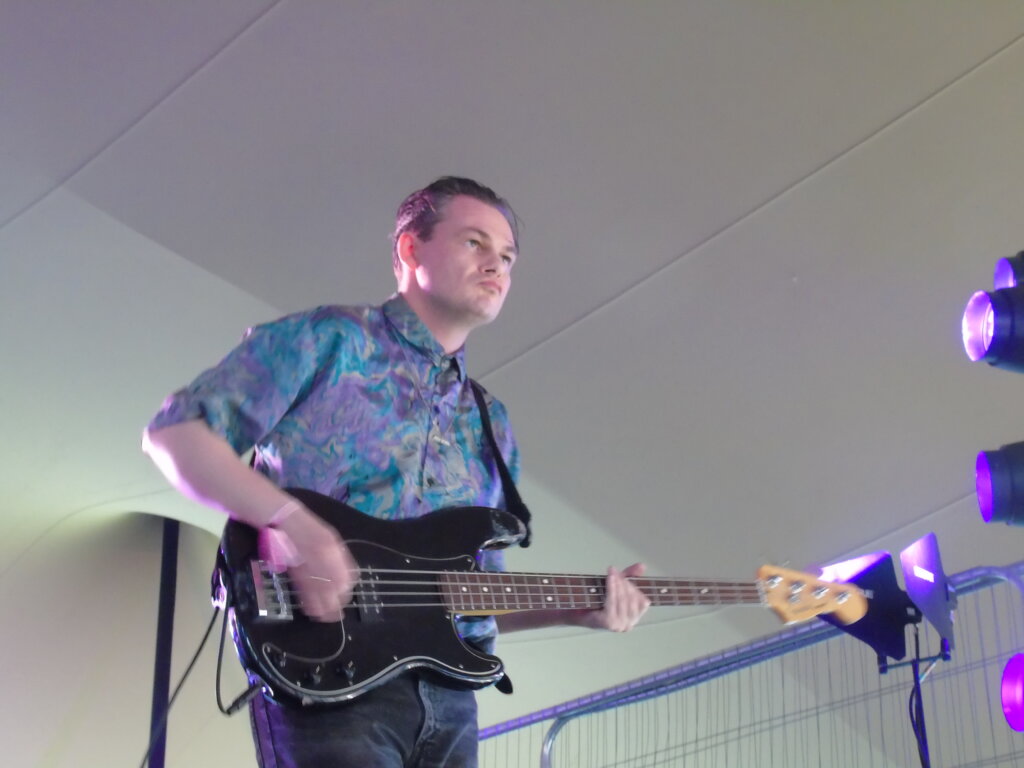
Osees
According to a friend of mine, the Osees played a three hour set last night at Digbeth Crossing without breaking a sweat, and according to the Osees they also wrote a new song last night after a bit of cocaine, so it’s a good job they weren’t on during the day time because they probably wouldn’t have been awake then. Osees are part men, part machine. Fans will know the insane amount of music they churn out on an annual basis and it’s never bottom of the barrel.
John Dwyer’s drive and energy is clear to see. They are one of the few acts that begin on time today, with most of the artists I’ve seen being 10–30 minutes late. I wouldn’t have expected it of them, it is not befitting of a band who play with military precision.
There are two drummers in the formation tonight, and it’s hypnotic watching them at times play in synchronicity, literally never missing a beat. Then we run into tech trouble: whilst the group may be able to play three-hour gigs and then go on into the night, the equipment has less stamina. Dwyer’s guitar cuts out a couple of times and the audience lets out a groan. It seems to be under control until they begin to play ‘Toe Cutter’ and Dwyer wanders around the back of amps and monitors to inspect the issue, the rest of the band fill out the time and it becomes apparent that even the mistakes the Osees make are perfectly timed as they repeat the song’s main riff in unison.
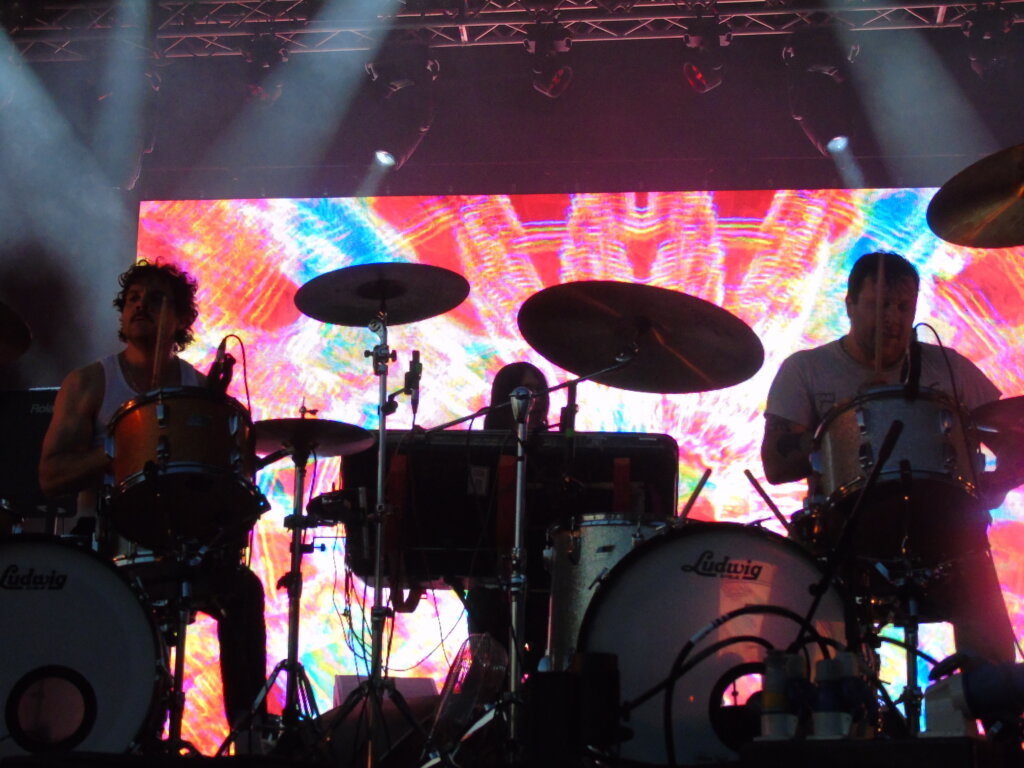
At one point I spot Dwyer casually playing a guitar solo as he sips out of a beer can. Seriously, they could be doing this in their sleep. The audience is in the mood for rowdiness tonight and when asked whether they want to hear a “psychedelic one” or a “punk one”, everyone votes punk so the set plays out fast and furious, though 100% times better than that film franchise. It’s the perfect end to the day.
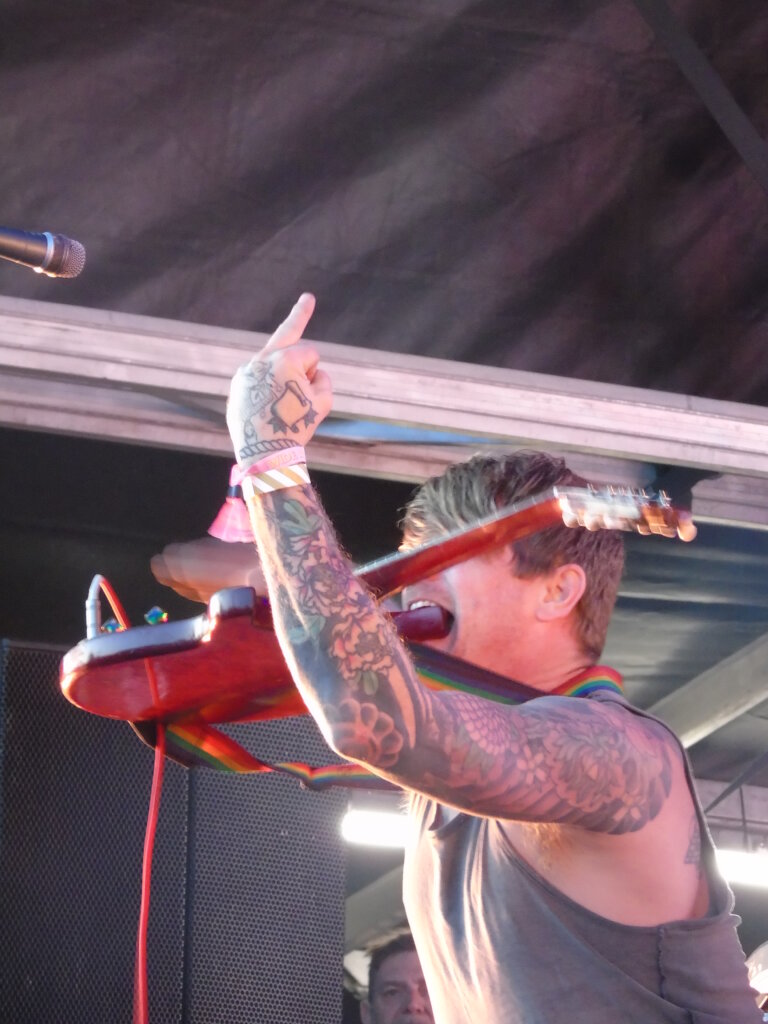
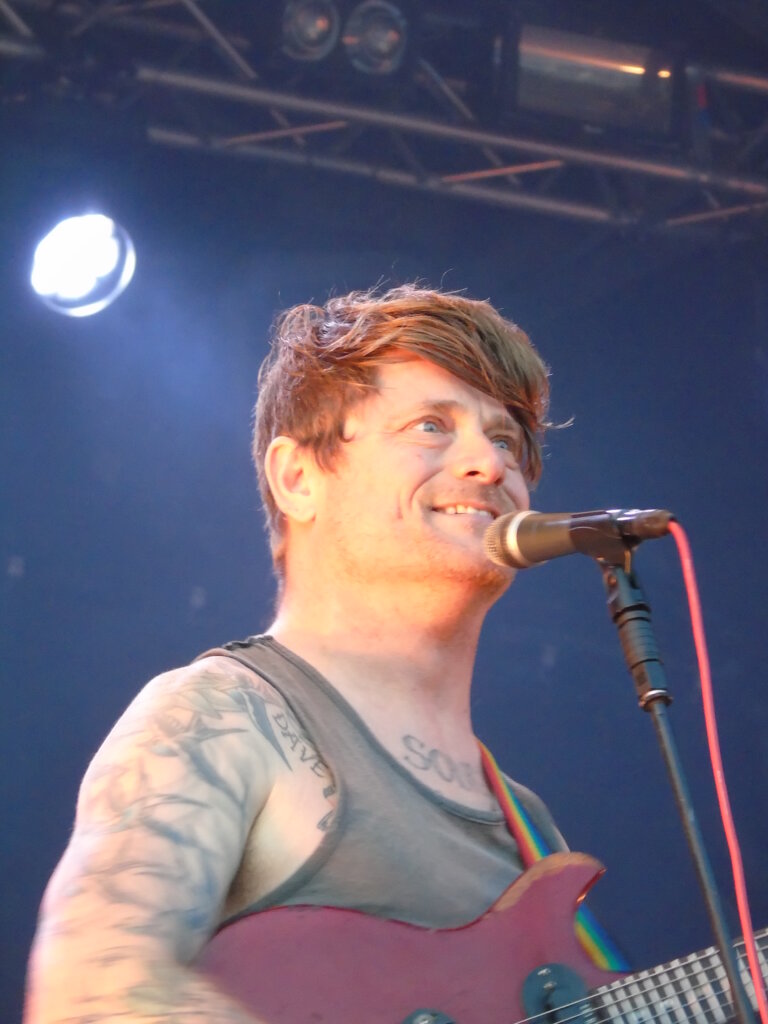
As the crowd filters out of the park and onto the streets of Brixton, people discuss their varying highlights. The atmosphere of the festival even at the end of the night has a residing welcoming friendliness that really showcases the excellent curation and application of the event (there’s definitely no Woodstock ’99 vibes here). Let’s hope next year’s festival is just as good.
All photos by Thomas Mannay.

